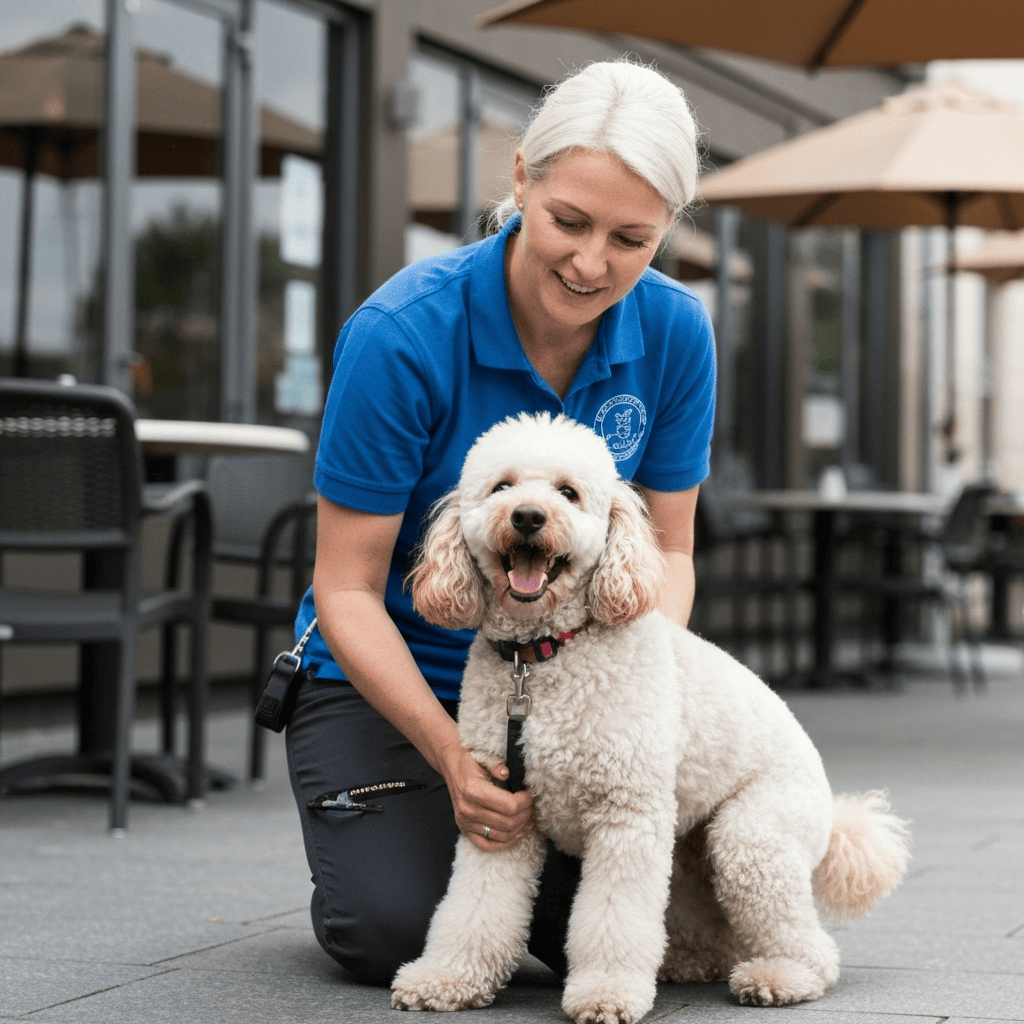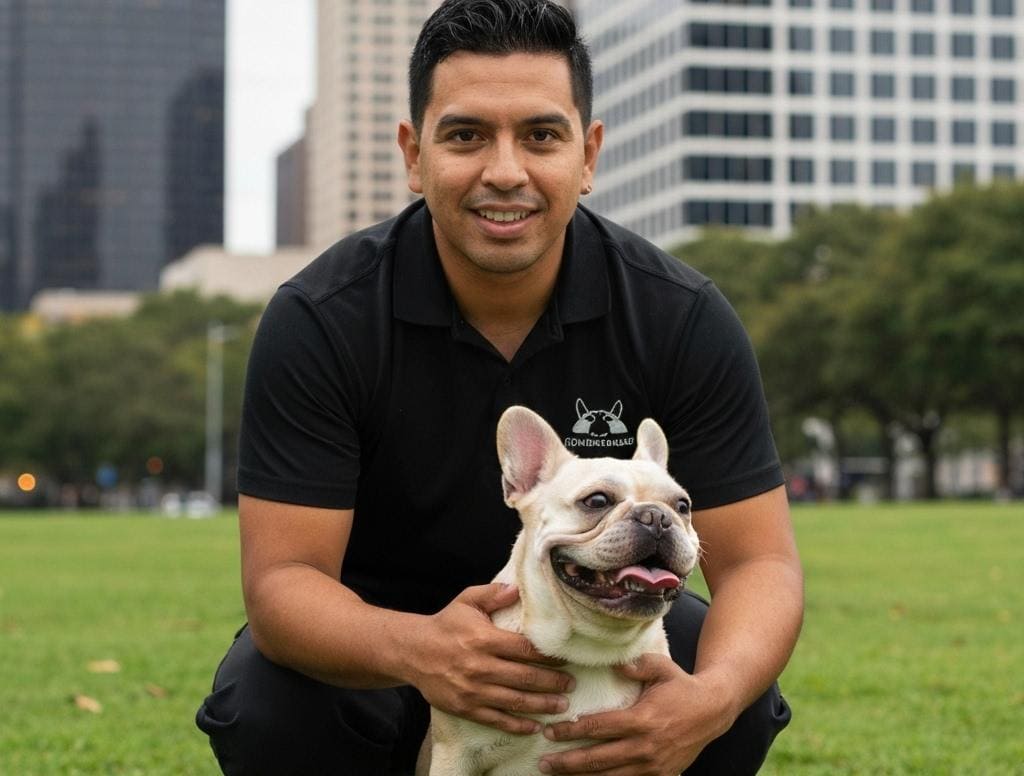Your Complete Guide to Choosing a Dog Trainer in Plano
When you’re walking your dog through the bustling streets around Legacy West, then heading to the peaceful trails at Oak Point Park later that afternoon, you quickly realize training needs to work in real life, not just in a quiet classroom. Living in Plano means your dog encounters everything from crowded restaurant patios to busy multi-use trails, and that requires a different approach to training.
Finding the right trainer here in Collin County can feel overwhelming. This guide will walk you through what makes a good trainer, what you can expect to pay locally, and how to practice those new skills around town.
How to Choose the Right Trainer
The best trainers focus on teaching you and your dog skills that actually work when you’re out and about in Plano. Think about it – you need your dog to walk nicely on a leash when you’re navigating the crowds at The Shops at Legacy, not just in an empty training room.
Positive reinforcement forms the backbone of effective training. Your trainer should be someone who builds your dog’s confidence rather than breaking it down. When you’re interviewing potential trainers, ask about their experience with your specific challenges, whether that’s puppy nipping or leash reactivity on busy sidewalks.
Credentials matter, but they shouldn’t be confusing. Look for trainers who hold respected certifications like KPA-CTP, CPDT-KA, or CTC. If you’re dealing with more complex behavior issues like fear or aggression, seek out professionals with advanced credentials such as IAABC-CDBC or CBCC-KA. You can learn more about these different dog trainer certifications to understand what they mean.
Living in Plano also means dealing with apartment buildings, HOA communities, and close neighbors. Your trainer should understand how to address barking issues, teach proper elevator etiquette, and help with door manners that work in your specific living situation.
Common Dog Training Methods That Actually Work

The most successful training programs in Plano center around methods that build trust between you and your dog while preparing them for real-world situations.
Positive reinforcement works by rewarding the behaviors you want to see more often. When your dog sits politely instead of jumping on visitors, they get a treat or praise. This approach works whether you have an 8-week-old puppy or a 5-year-old rescue, and it’s particularly effective in busy environments like downtown Plano.
Many trainers use clicker training as part of their positive approach. The click sound marks the exact moment your dog does something right, which helps them learn faster and keeps training sessions fun for both of you.
For dogs dealing with fear, reactivity, or anxiety, trainers often use desensitization and counterconditioning. This means gradually exposing your dog to whatever bothers them while pairing it with good things like treats or play. It takes time, but it actually changes how your dog feels about their triggers.
Management strategies prevent your dog from practicing problem behaviors while they’re learning better ones. This might mean using baby gates, choosing the right harness, or setting up your home in ways that make success more likely.
The key is real-world proofing – practicing skills in the places where you actually need them. A good trainer will start with easier environments and gradually work up to busier spots like parks and restaurant patios.
Stay away from any trainer who talks about “dominance,” uses shock collars, or relies on intimidation. These approaches can create more problems and damage the relationship you’re building with your dog.
Plano Laws and Practical Requirements
Understanding local rules helps keep your training on track and avoids unnecessary complications with neighbors or authorities.
Plano requires dogs to be on leash when they’re off your property. This includes parks, trails, and sidewalks throughout the city. You can find complete information about local animal ordinances through Plano Animal Services.
Texas state law requires all dogs to have current rabies vaccinations. The specific requirements are detailed in Texas Health and Safety Code Chapter 826. Your trainer may ask for proof of vaccination before starting classes.
Noise complaints can become an issue, especially in apartment complexes and HOA communities around Plano. Training that includes mental enrichment and teaching your dog to settle calmly when alone can prevent barking problems before they start.
Plano strongly encourages microchipping your dog for permanent identification. If your pet gets lost, Collin County shelters prioritize reuniting microchipped animals with their families. You can learn more through Collin County Animal Services.
If your trainer wants to hold classes in city parks, they may need special permits for commercial activities. Both trainers and dog owners can check park use policies and facility information at Plano Parks & Recreation facilities.
There’s no special license required for dog trainers in Texas or Collin County. Most operate as regular small businesses, but you should still ask about insurance coverage.
Why Credentials and Insurance Matter
When a trainer has proper credentials, it shows they’ve invested in education and follow professional standards. When they carry insurance, it protects everyone if something goes wrong during a session.
If you’re dealing with behavior issues involving fear, anxiety, or aggression, look for trainers with advanced education in animal behavior. Certifications like IAABC-CDBC or CBCC-KA indicate specialized training in these areas.
What Dog Training Costs in Plano (2025 Update)
Training prices in Plano and the surrounding Collin County area vary based on the trainer’s experience, session length, and format. Here’s what local families typically pay in 2025.
| Service Type | Plano Area Price Range |
|---|---|
| Group class (4-6 weeks) | $180 – $325 |
| Private session (60-90 minutes) | $110 – $200 |
| Puppy training package (4-6 lessons) | $380 – $700 |
| Day training (per week) | $550 – $1,000 |
| Board and train (2-4 weeks) | $2,200 – $4,800 |
| Behavior consultation | $150 – $275 |
Expect higher rates for complex behavior cases, travel outside standard service areas, or trainers with advanced certifications and extensive experience. Always ask what’s included in the price, how they measure progress, and what kind of practice they expect you to do between sessions.
Questions to Ask Before Hiring a Trainer
- What training methods do you use, and how do you keep sessions positive for my dog?
- What certifications do you hold, such as KPA-CTP, CPDT-KA, or CTC?
- How will you create a training plan that works for my dog’s needs and my schedule?
- Do you offer in-home training, group classes, or day training, and which would work best for my situation?
- How do you help dogs practice around real distractions like busy parks and restaurant patios?
- What are your total costs, package deals, travel fees, and cancellation policies?
- Do you carry liability insurance, and can you show me a current certificate?
- For behavior problems, do you work with veterinarians when needed?
Local Resources for Training Practice

These Plano locations offer great opportunities to practice new skills with your dog while following local rules.
- Jack Carter Dog Park at Jack Carter Park provides fenced areas with double gates, water stations, and plenty of space for practicing recall commands around other dogs.
- Windhaven Meadows Park Dog Park has separate areas for large and small dogs, plus open space where you can work on attention exercises while other dogs are nearby.
- Oak Point Park & Nature Preserve and Bob Woodruff Park offer excellent leashed training opportunities with wide trails where you can gradually increase distractions as your dog improves.
For city information and services, visit Plano Animal Services for local rules, lost pet resources, and general guidance.
Collin County Animal Services provides additional support for microchip information, shelter services, and public safety resources.
Check Plano Parks & Recreation facilities for specific dog park details and current park use policies.
Remember to bring high-value treats, a standard 6-foot leash, and water for both you and your dog. Keep your dog leashed outside designated off-leash areas and always follow posted rules.
Making Your Final Decision
Plano families are busy juggling work, kids, and daily life, so your training approach needs to be straightforward and practical. Focus on trainers who use humane methods, explain their plan clearly, and set measurable goals that fit your lifestyle.
If you live near high-traffic areas like Dallas North Tollway or US-75, ask specifically about strategies for handling traffic noise and sudden distractions. For those in apartments near DART lines, make sure your trainer can help with elevator manners and hallway behavior.
The right trainer will coach you as much as they train your dog, giving you tools to maintain progress long after formal sessions end.

Frequently Asked Questions
Do I need a licensed trainer in Plano or Collin County?
There’s no special trainer license required in Texas or Collin County. Focus on finding trainers with solid education, relevant experience, and recognized certifications.
What vaccinations does my dog need?
Texas requires current rabies vaccination for all dogs. Your veterinarian may recommend additional vaccines based on your dog’s age, health, and lifestyle. State requirements are outlined in Health and Safety Code Chapter 826.
Are there leash laws in Plano?
Yes, dogs must be on leash when off their owner’s property. This includes all public areas like parks, trails, and sidewalks. For complete local animal ordinances and resources, visit Plano Animal Services.
Can trainers hold classes in Plano parks?
Individual practice sessions following posted rules are fine. Trainers running organized classes or commercial activities should confirm park permissions through Plano Parks & Recreation facilities.
What should I budget for private training in Plano?
Most private sessions range from $110 to $200, with package deals typically lowering the per-session cost. Complex behavior cases and highly credentialed specialists charge more.
Where can I practice around other dogs safely?
The fenced areas at Jack Carter Dog Park or Windhaven Meadows Dog Park work well for practicing recall and calm greetings. Start during quieter times and gradually work up to busier periods as your dog improves.
Finding the right dog training in Plano doesn’t have to be complicated. Focus on trainers who use humane methods, practice in real-world settings, and communicate clearly about their approach. With the right guidance, your dog can learn to handle everything from quiet neighborhood walks to busy downtown adventures with confidence.
